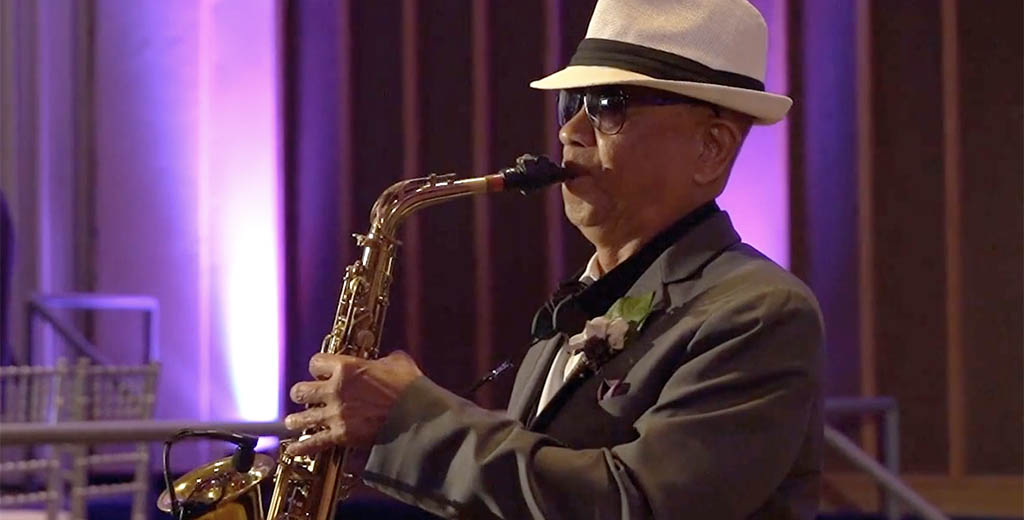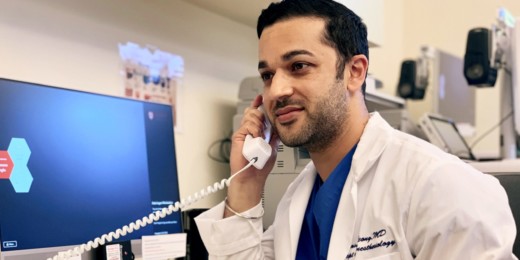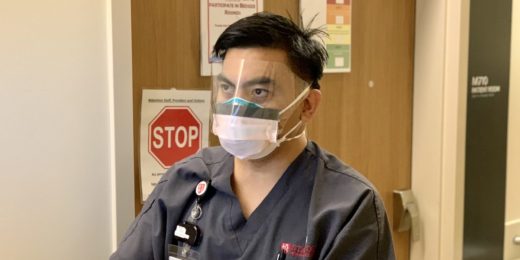The text that brought the large Victorio family to its knees arrived late on a December evening, sent by the family's 83-year-old patriarch Ruben Victorio, who was hospitalized with COVID-19. It read:
I talked to my Doctor today and told him I want to go Peacefully. I am suffering so much and I can't manage anymore. Don't know when I will be going. I will decide. Love all of you. Wonderful journey with my family.
"We'd never seen him say anything like that before," said Sallie Manibusan, the second of Ruben Victorio's three adult daughters. "We lost it, we were just so upset."
His oldest daughter, Darlene LaCotti, grabbed her cell phone, frantically trying numbers in an effort to reach one of Victorio's physicians, Nidhi Rohatgi, MD. She left an urgent voicemail, "If this is Dr. Rohatgi, can you please call me?"
Answering the call
The sisters thought that Victorio might have misunderstood the reason for a routine goal-setting conference with his care providers earlier in the day; he thought they had talked to him because his death was imminent. His spirits sank and he typed out the emotional message, wanting to let his family know how important they were to him.
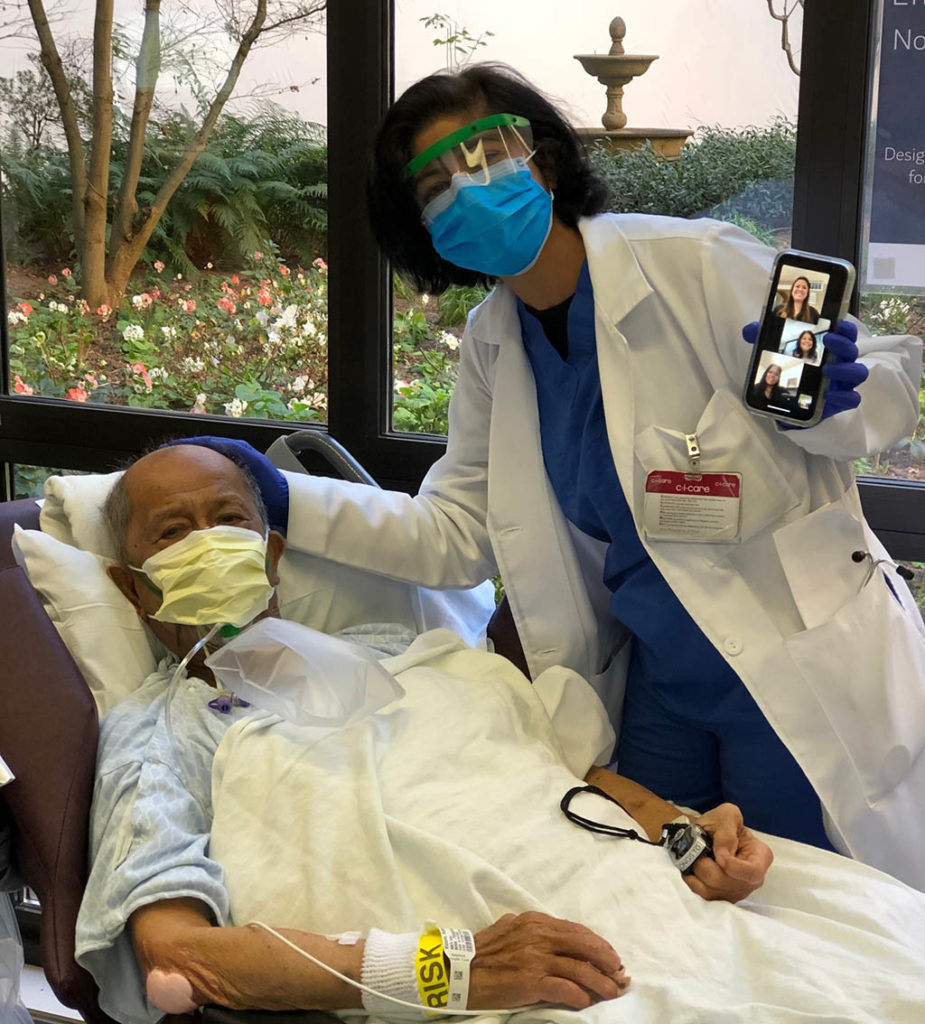
The text left the family, who were not able to visit Victorio in the hospital, fearful and worried. Nonetheless, they stuck to their evening ritual, bonding through a virtual prayer group they formed with extended family members throughout the United States and the Philippines when Victorio entered the hospital in early December.
During the vigil, LaCotti's phone rang. It was Victorio's physician, Rohatgi, returning the call from her home.
Elated to connect, LaCotti explained the text family members had received, which seemed uncharacteristic of Victorio, who rarely expressed his feelings. "I asked Dr. Rohatgi, 'Can you go see him in the morning if possible, to reassure him?'"
But Rohatgi didn't wait until morning.
"I drove back to the hospital again that night because no human should ever go to bed without hope in their heart," she said.
A turning point
Victorio was in a very dark place, she said. "He had lost hope of ever recovering from COVID-19 or getting his quality of life back. He was exhausted after spending weeks in the intensive care unit struggling for every breath."
That evening in the hospital, Rohatgi sat beside Victorio and listened. Music was a driving force in Victorio's life. In healthier times, he was a saxophone player: He was admitted into the U.S. Naval Academy Band, and he composed his own music.
Now, in the hospital, the music that had animated his life was gone.
"He feared he may have lost the power in his lungs with COVID-19 and that his life was not worth it without music," Rohatgi explained.
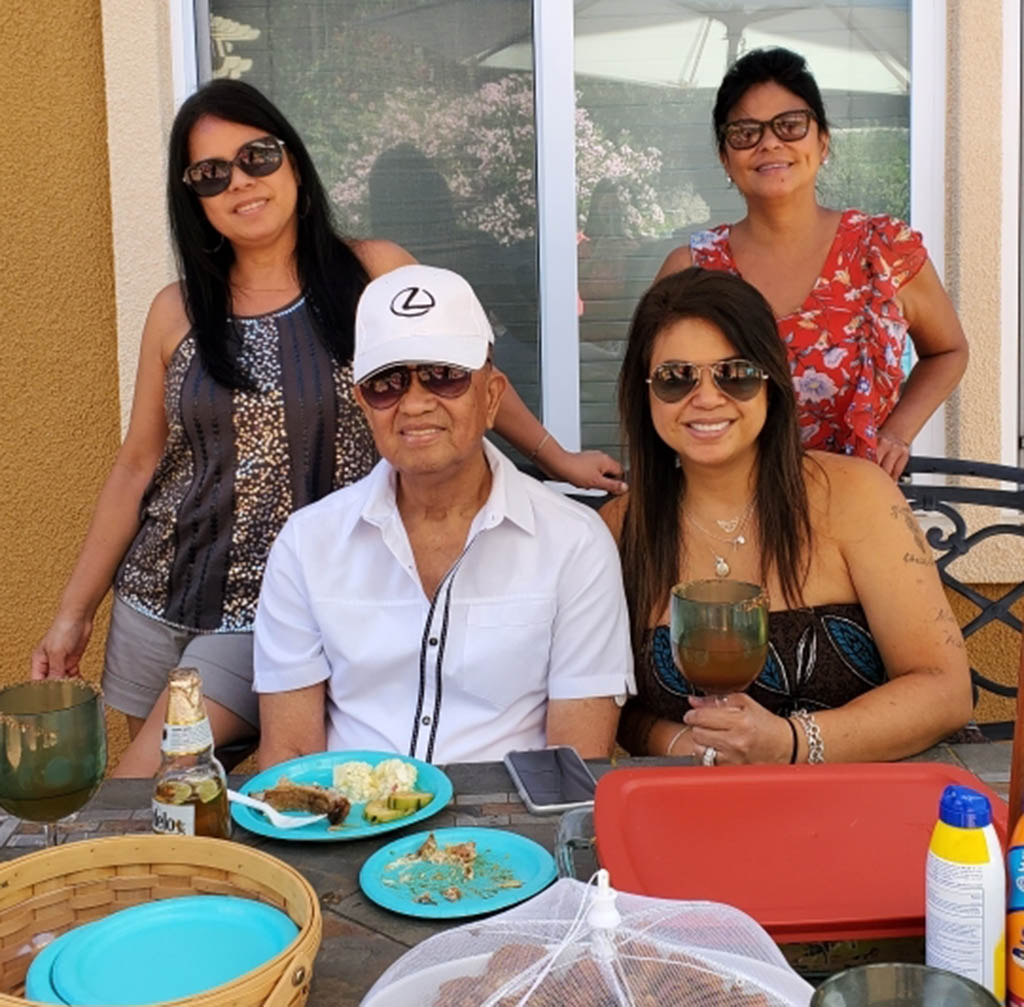
As the night grew later, their conversation continued: one doctor, one patient and a lifetime full of memories, hopes and fears exposed by the ravages of COVID-19. When the emotions grew too intense, Victorio became quiet, or changed the topic to weather, politics, gelato. His youngest daughter, Kimberly Dela Sierra, had rushed to the hospital with one of his favorite dishes -- the Filipino soup sinigang -- and Rohatgi slowly fed him spoonfuls.
Suddenly, a spark lit up his eyes.
"He said that his life's best work are his children and grandchildren. He pulled out his phone, scrolling through his pictures and started sharing them with me," Rohatgi said.
Victorio asked to talk with his daughter and Rohatgi dialed Dela Sierra. She patched in her sisters and before long, they were all in tears.
"Kim kept saying, 'I love you, dad,' repeatedly. I could see tears in his eyes too, but he chose to be stoic and just said, "The sinigang was lukewarm, not hot, you know I like hot soup only," Rohatgi said. "We all burst into laughter."
Victorio's spirits visibly improved, Rohatgi left the hospital, returning home after a long day.
Damn the torpedoes
The next morning, as Rohatgi entered the room, Victorio's greeting was a bold call, "Damn the torpedoes!"
"I didn't understand at first," Rohatgi said. "But then he explained how he served in the military in his youth and said he was never even afraid of the torpedoes then and is ready to fight now. 'Never give up till it is time to,' he said."
Victorio, the spirited father and grandfather, musician and man, was back.
"He was a new person," said Manibusan.
"It totally changed his mind frame," said LaCotti. "He went from saying goodbye to he's going to fight now."
And the fight was on.
Victorio had diabetes but was always the healthiest in his family, his daughters said. He did video exercises for 45 minutes in the yard, rain or shine, walked regularly and ate healthy food, eschewing the fat-packed Filipino dishes his family loved.
But now, COVID-19 had invaded his airways, leaving him weak, uninterested in food and struggling for breath. From afar, his family tracked his oxygen levels and blood counts, sent him messages, photos and music, set up calls and video conferences, and prepared special foods to try to revive his appetite.
Some days, he needed to be fed via a tube, or flipped onto his stomach to try to get air in. Other days went a bit better.
"We tell him he already conquered the hardest part of COVID," LaCotti said.
A grand performance
One day, Victorio mentioned to Rohatgi that, when he recovered, he was going to return to the hospital and play the saxophone.
He was still quite ill and Rohatgi wanted to make his wish come true sooner rather than later. So, Dela Sierra provided a CD of Victorio's music. Rohatgi plotted with other care team members and a plan was hatched.
On Jan. 20, the team wheeled Victorio to the hospital's atrium, where they broadcast his music.
"People were coming up and telling him, 'Your music made me happy'," Manibusan explained.
The moment meant a lot to Rohatgi as well.
"The music is so beautiful," Rohatgi said. "And to me, my patient is the most important in the world. I am so thankful we were able to grant his wish."
It was an answer to the prayers of his family -- as many as 50-strong -- who joined together remotely in the evening prayer group for healing and encouragement.
"We stuck together as a family," LaCotti said. "We did this together."
On March 31, after 60 days at Stanford followed by stays in a long-term acute care hospital and a rehabilitation facility, Victorio came home.
Related: ABC7 News aired a segment on Victorio's experience with COVID-19, which can be viewed here.
The Voices of COVID series captures the stories of the many people at Stanford Medicine who have been stepping up to the challenge of the pandemic. Follow along on social media and look for new stories regularly.
Screen grab image of a JKapture Studios video of Ruben Victorio during healthier times playing saxophone at a wedding.


